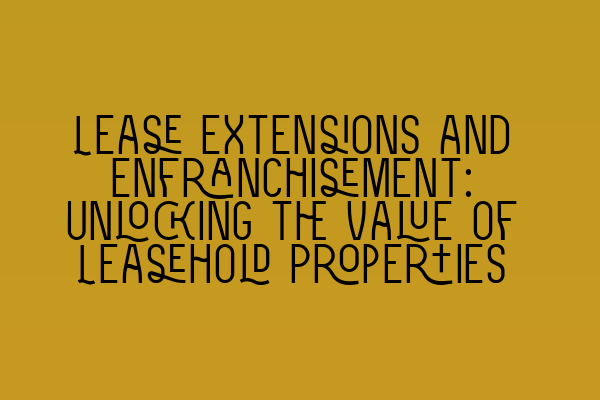Lease Extensions and Enfranchisement: Unlocking the Value of Leasehold Properties
Leasehold properties have become increasingly popular in the UK property market, offering a unique set of advantages and challenges for both landlords and tenants. However, one significant issue that often arises is the limited term of the lease. Fortunately, there are legal avenues available to extend the lease or even acquire the freehold of the property, known as lease extensions and enfranchisement, respectively. In this article, we will delve into the world of lease extensions and enfranchisement, exploring the key concepts, benefits, and processes involved.
What is a lease extension?
A lease extension is the process of prolonging the lease term on a leasehold property. Leasehold properties are typically held for a specific number of years, after which they revert back to the freeholder. As the lease term decreases, the value of the property tends to diminish, making it crucial for leaseholders to consider extending their lease to maintain its marketability and value.
Lease extensions give leaseholders the opportunity to secure a longer lease term, providing them with peace of mind and protecting their investment. A longer lease can also make the property more appealing to potential buyers, increasing its marketability and potentially enhancing its value.
Updates in UK Property Laws: Key Changes and Implications
What is enfranchisement?
Enfranchisement, on the other hand, refers to the process through which leaseholders have the right to purchase the freehold of their property. This allows them to take full ownership of the building and the land it sits on. Enfranchisement can be an attractive option for leaseholders who are looking to gain more control over their property and escape the limitations and potential pitfalls associated with leasehold ownership.
In addition to acquiring the freehold, enfranchisement grants leaseholders the freedom to make alterations and improvements to the property without seeking permission from the freeholder. This newfound control and autonomy can be highly valuable to leaseholders.
Legal challenges in property transactions: A comprehensive guide
Why should leaseholders consider lease extensions or enfranchisement?
Lease extensions and enfranchisement offer numerous benefits for leaseholders. Firstly, by extending the lease or acquiring the freehold, leaseholders gain peace of mind and long-term security. They no longer have to worry about their lease running out and potentially facing expensive renewal costs.
Secondly, lease extensions and enfranchisement can significantly enhance the value of the property. Longer lease terms or outright ownership make the property more attractive to prospective buyers, potentially leading to higher offers and a faster sale. This increased marketability can be particularly advantageous in a competitive property market.
Furthermore, lease extensions and enfranchisement provide leaseholders with a greater degree of control and flexibility over their property. They can carry out renovations and improvements without seeking consent from the freeholder, allowing them to create a home that truly reflects their preferences and lifestyle.
Navigating Lease Laws in the UK: Essential Guidelines for Tenants and Landlords
How to extend a lease or acquire the freehold?
The process of lease extension or enfranchisement can be complex, involving legal intricacies and potential disputes. It is essential to seek professional advice from a qualified property solicitor who specializes in lease extensions and enfranchisement.
The first step typically involves determining your eligibility for lease extension or enfranchisement. It is important to consult the terms of your lease, which may include specific provisions regarding extending the lease or acquiring the freehold.
Once eligibility is established, the next stage is initiating negotiations with the freeholder or their representatives. This may involve reaching an agreement on the terms of the lease extension or enfranchisement, including the premium to be paid, the length of the extended lease, and any additional rights or clauses.
Once a tentative agreement is reached, the solicitors for both parties will work to finalize the details, ensuring all legal requirements are met. This includes drafting and executing the necessary legal documents and submitting them for registration with the appropriate authorities.
Understanding the complexities of the lease extension and enfranchisement process is crucial to navigating it successfully. Engaging an experienced property solicitor will provide you with the guidance and expertise needed to achieve the best possible outcome.
Dominate Property Law Questions: Avoiding Common Pitfalls
Conclusion
Lease extensions and enfranchisement offer leaseholders the opportunity to unlock the true value of their leasehold properties. Whether it is extending the lease term or acquiring the freehold, these processes can provide long-term security, enhance property value, and grant leaseholders greater control and autonomy. Nevertheless, it is imperative to seek professional advice from a property solicitor specializing in lease extensions and enfranchisement to ensure a smooth and successful outcome. By taking the necessary steps and engaging expert assistance, leaseholders can effectively navigate the complexities of leasehold property ownership, maximizing the potential of their investment.
